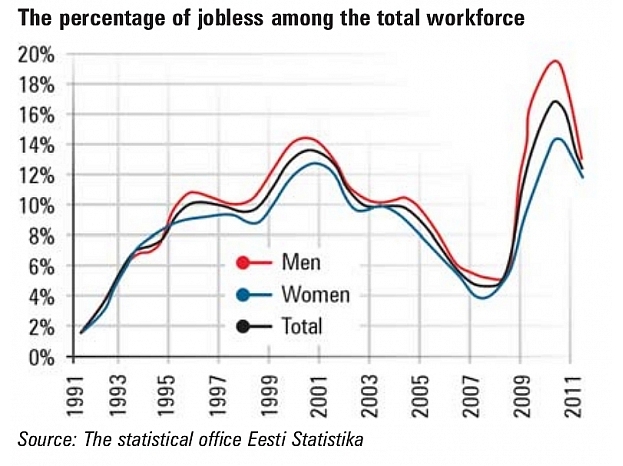Labour market of Estonia
* in average, the unemployment rate stood at 12.5% in 2011;
* Estonia’s average labour cost growth by 7.2% y-o-y in 2011;
* average salary increased the most in wholesale and retail trade.
* Estonia’s labour market has recovered quite rapidly from the recent recession in 2011. While the unemployment level is still higher than in the boom years 2006–2007, employment has increased fast mostly due to a bloom in exporting industry.
* At the same time, wages and employment costs have increased as well as companies fight to hire good skilled workers who in turn are tempted to move abroad, mostly to Finland, where the basic salary level is significantly higher.
Unemployment
* According to the quarterly labour survey of the statistical office Eesti Statistika, the number of unemployed people increased by 2,000 to 79,000 in the 4th quarter of 2011 compared to the previous quarter. The percentage of jobless people among the total workforce stood at 11.4% in Q4, 0.5 percentage points higher than in Q3. However, until the last quarter of the year, the unemployment rate had dropped gradually in every quarter since the highest level in Q1 2010 (19.8%).
* In average, the unemployment rate stood at 12.5% in 2011, down by 4.4 percentage points from the previous year – the largest annual drop in unemployment in the last 20 years.
* While during the recession the rate of unemployment among men increased at a far higher pace compared to that of women, the statistical office recorded an opposite trend last year. The major factor behind men's unemployment increasing fast during the recession was the collapse of the real estate boom, which led to a serious contraction in the construction sector, mostly employing men. The recovery of the latter due to an increase in investments into infrastructure construction as well as to growing construction services exports have cut men's unemployment in 2011. Nevertheless, the jobless rate among men – 13.1% – still stood higher than that of women (11.8%) in 2011.
* While overall unemployment declines, the long-term unemployment has grown recently. In 2011, 49,000 people, or 57% of the total count of jobless persons, were unemployed for over a year or even longer. Of them, 28,000 have been without a job for over two years.
* The number of employed persons decreased by 2.1% in Q4 compared to Q3 to 615,000. In yearly comparison, employment grew, however, by 3.6%. According to the statistical office, the growth in employment was influenced the most by an increased number of people employed in manufacturing, construction, logistics, ITC and agriculture sectors.
* In fact, the ITC sector was less suppressed by the recent recession than most sectors. Estonian IT firms, having craved for additional workforce throughout the recent decade, kept on hiring even in the recession years. In 2008 and 2009, a significant part of the employment ads in recruitment web-portals were posted by the Estonian subsidiaries of international software companies Skype and Playtech, while the domestic firms also sought for additional workforce. The constant lack of IT engineers has even forced several companies to look to neighbouring countries - for instance, the software producer WebMedia is about to significantly increase the staff count in its Lithuanian office in 2012 instead of hiring at home.
* Similarly to the previous year, employment grew mostly due to the increased activity of people formerly not participating in the labour market. In addition to young people - recently graduated students and also students looking for part-time employment to finance their studies - a significant amount of pensioners re-entered the labour market as well.

Autors: darba_tirgus_igaunija_en_31_1_en_6_784x606
Renumeration
* Monthly employment costs rose by 6.3% y-o-y in Q4 2011 to EUR 1,175, and the hourly costs by 7% to EUR 7.54, according to Eesti Statistika. Of sectors, average monthly employment costs rose the most in retail and wholesale trade, by 12.1% y-o-y, while hourly employment costs increased the most (14.3%) in real estate activities.
* In fact, Estonia's average labour cost growth by 7.2% y-o-y in 2011 was the third highest in the 27-member European Union, behind of only Romania and Bulgaria, reports Eurostat. For comparison, the average growth of labour costs was 2.7% y-o-y in the EU.
* In the 4th quarter of 2011, Estonia's average monthly salary rose above pre-recession levels, increasing by 6.3% to EUR 865. Average salary, which fell in 2009 and 2010 due to the recession and high unemployment, started to rise again in 2011.
* In Q4, average salary increased the most in wholesale and retail trade – by 11.8% y-o-y, followed by R&D (10.5%), construction (6.9%) and HoReCa (6.9%). According to a statement sent by the Ministry of Finance to media, salaries increased in retail trade sector due to new stores and supermarkets opening in 2011.
* Most notably, the huge one-off bonuses that were received by the finance sector employees in years 2006-2008 in the final quarters of the year, were absent in 2011 just like in 2009 and 2010, despite the fact that the banks had a profitable year.
* However, real wage, which accounts also for the impact of inflation, only rose for a second quarter in succession following a consecutive drop of 11 quarters. In Q4, real wage increased by 2.1% compared to the same quarter last year.

Photo: Stock.XCHNG





